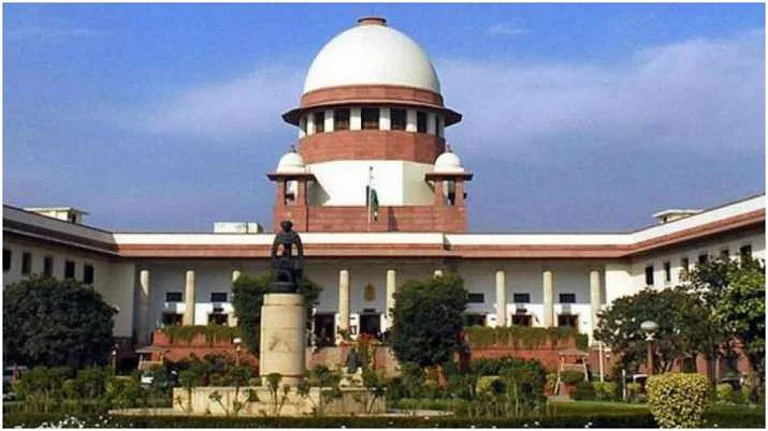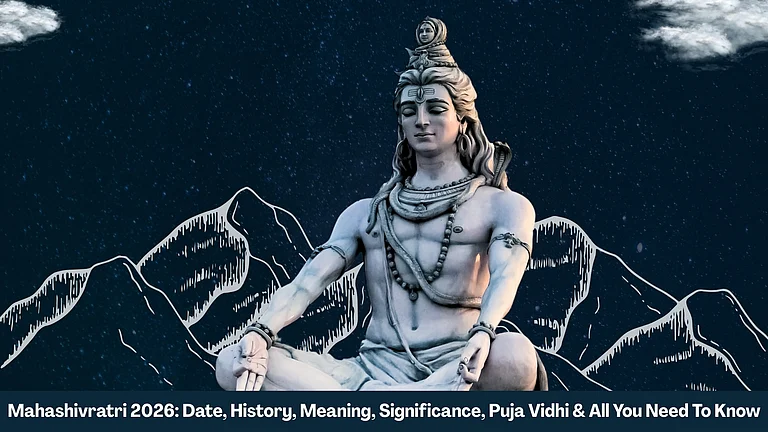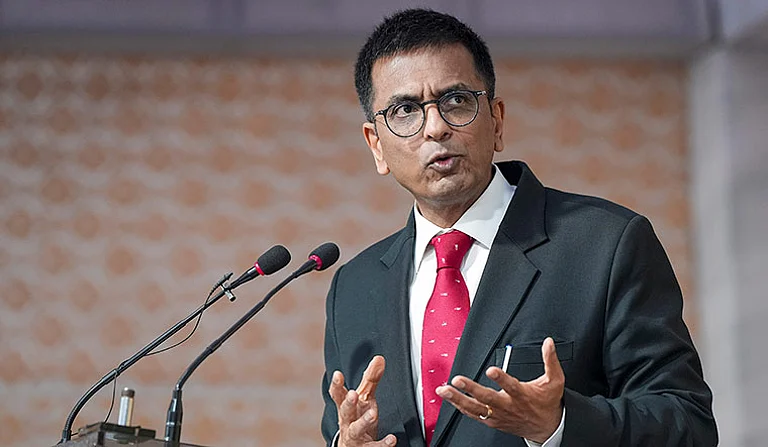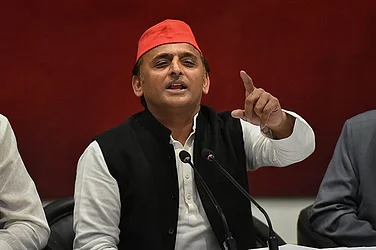Prime Minister Narendra Modi on Wednesday visited Chief Justice of India DY Chandrachud's residence in New Delhi to take part in Ganpati Puja, leading to criticism from opposition members.
Clad in a traditional Maharashtrian attire, PM Modi was welcomed by the CJI and his wife Kalpana Das. In a video, which is now being widely circulated on social media, the PM was seen performing Ganpati Puja with the two.
Later, Modi also took to X and said, "Joined Ganesh Puja at the residence of CJI, Justice DY Chandrachud Ji. May Bhagwan Shri Ganesh bless us all with happiness, prosperity and wonderful health."
However, Modi's visit led to a trail of reactions from the Opposition as well as the common public. But, what is notable here is that Supreme Court lawyer and author Prashant Bhushan highlighted that the CJI was in 'violation' of the code of conduct prescribed for judges.
In a post on microblogging site X, Bhushan expressed 'shock' over CJI Chandrachud allowing the PM to visit him at his residence for a private meeting.
"Sends a very bad signal to the judiciary which is tasked with the responsibility of protecting fundamental rights of citizens from the executive and ensuring that the govt acts within bounds of Constitution. That is why there has to be an arms length separation between the executive and the judiciary," he added.
Shedding light on the apex court's code of conduct for judges, Bhushan quoted, "A Judge should practice a degree of aloofness consistent with the dignity of his office. There should be no act or omission by which is unbecoming of the high office he occupies and the public esteem in which that office is held."
"Violation of Code," he exclaimed.
Code Of Conduct For Judges
The prescribed code for values of judicial life was adopted by a Full Court Meeting of the Supreme Court on May 7, 1997.
The top court document which mentions the 16 values, however, notes that "these are only the 'Restatement of the values of Judicial Life' and are not meant to be exhaustive but illustrative of what is expected of a Judge".
"Justice must not merely be done but it must also be seen to be done." It is stated that the conduct of the members of the higher judiciary must reaffirm people's belief in the justice system.
Any act of a Supreme Court or a High Curt judge -- whether official or personal -- has to avoid the disintegration of the judiciary's credibility.
A Judge should not contest the election to any office of a Club, society or other association; further he shall not hold such elective office except in a society or association connected with the law.
Close association with individual members of the Bar, particularly those who practice in the same court, shall be eschewed.
A Judge should not permit any member of his immediate family , such as spouse, son, daughter, son- in-law or daughter-in-law or any other close relative, if a member of the Bar, to appear before him or even be associated in any manner with a cause to be dealt with by him.
No member of his family, who is a member of the Bar, shall be permitted to use the residence in which the Judge actually resides or other facilities for professional work.
A Judge should practice a degree of aloofness consistent with the dignity of his office.
A Judge shall not hear and decide a matter in which a member of his family, a close relation or a friend is concerned.
A Judge shall not enter into public debate or express his views in public on political matters or on matters that are pending or are likely to arise for judicial determination.
A Judge is expected to let his judgments speak for themselves. He shall not give interview to the media.
A Judge shall not hear and decide a matter in which a company in which he holds shares is concerned unless he has disclosed his interest and no objection to his hearing and deciding the mater is raised.
A Judge shall not speculate in shares, stocks or the like.
A Judge should not engage directly or indirectly in trade or business, either by himself or in association with any other person. (Publication of a legal treatise or any activity in the nature of a hobby shall not be construed as trade or business).
A Judge should not ask for, accept contributions or otherwise actively associate himself with the raising of any fund for any purpose.
A Judge should not seek any financial benefit in the form of a perquisite or privilege attached to his office unless it is clearly available. Any doubt in this behalf must be got resolved and clarified through the Chief Justice.
Every Judge must at all times be conscious that he is under the public gaze and there should be no act or omission by him which is unbecoming of the high office he occupies and the public esteem in which that office is held.
Apart from the spotlight on the code of conduct, several opposition leaders have also criticised Modi visiting CJI Chandrachud's residence.
OPPOSITION'S CRITICISM
Shiv Sena (UBT) leader Sanjay Raut spoke about the 'Aarti', the PM and CJI performed together, saying that "if a custodian of the Constitution meets politicians, it can create doubt in the minds of people".
Noting that the Sena vs Sena case is pending before the Supreme Court, Raut said, "the hearing is going on before CJI Chandrachud so we have doubt if we will get justice because PM is the other party in the case. In our case, other party is the central govt."
The Sena UBT leader said that the CJI should distance himself from their case as his relation with another political party is "openly visible".
"Will CJI Chandrachud be able to give us justice in such a situation?" Raut asked. He alleged that the party has been getting hearing dates one after the other while an "illegal govt is going on".
"Shiv Sena and NCP were broken in such a way...we are not getting justice and PM Modi is taking a lot of interest in the illegal govt of Maharashtra, to save them. The CJI who is supposed to give us justice, with him PM has such a bond so yesterday a doubt was formed in the minds of Maharashtra," Raut added.
Aam Aadmi Party leader Sanjay Singh accused the BJP of using puja for political gains and said the party has made its motives clear.
"This means that BL Santhosh (BJP leader) has made is clear that the BJP uses puja for political gains. BJP has made it clear that the motive behind yesterday's puja (PM Modi attending Ganesh Puja at CJI Chandrachud's residence) was to create a flutter," Singh told reporters in Delhi.
What Netizen's Said On Social Media
Several social media users criticised the presence of Prime Minister Narendra Modi at CJI Chandrachud's residence. One of the netizens on microblogging site X said, "Head of executive, PM Modi, met head of judiciary, CJI Chandrachud, to celebrate Ganpati festival right before Maharashtra Elections."
"In a functioning democracy, Executive and Judiciary are supposed to maintain distance," he added.
Another user said, "Dear CJI DY Chandrachud, I had a huge respect for you since your decisions on Electoral Bonds case, today you've lost all."
BJP's Rebuttal
Hitting back at the condemnation received from the opposition, BJP MP Bhupender Yadav said that the guts of the same people, who applaud and encourage Prime Ministers' presence at Iftars, are twisting and turning when they see PM Modi perform Ganpati Puja at CJI Chandrachud's residence.
"The executive and judiciary praying before Gods revered by crores of devotees across India reflects the real strength of Indian secularism. Deal with it," Yadav said in a stern message on X.
BJP MP Sambit Patra, meanwhile, posed a series of questions, asking, "Should the different pillars of democracy not converge? Should they be enemies?... Should they have no courtesies towards each other?"
According to him, different behaviours being shown on and off duty, is the beauty of democracy. "You have an objection to the PM meeting the CJI but no objection when Rahul Gandhi meets Ilhan Omar, the Chinese Premiere and signs MoU, George Soros."
He also resounded Bhupender Yadav's opinion and asked, "They have a problem with Ganesh Puja but did the former PM Manmohan Singh not attend Iftaar parties?"
Bar Council of India Chairman and BJP's Rajya Sabha MP, senior Advocate Manan Kumar Mishra, said that those who are involved in cases will object a little, however, they also know that this "social-religious function" will not affect any Supreme Court judgment.
"PM went there and offered prayers and then he returned. If there had to be some different kind of meeting, it would have been done confidentially. They would have talked on FaceTime or WhatsApp," Mishra told reporters.
Making a veiled reference to Congress MP Rahul Gandhi's US visit, Mishra further said that neither Sanjay Raut nor any Congress leader spoke about "a politician who visited abroad and met anti-India elements".
"But if PM visited the CJI, instead of appreciating the good coordination between judiciary and executive it is being objected to," the senior Advocate said.
Did CJI Really Violate The Code?
While for some members of the opposition and a section of people on social media, CJI DY Chandrachud was in violation of the code of conduct for judges, the Supreme Court document itself doesn't categorically specify the titles who judges are not supposed to meet in private.
However, the code of conduct states that a judge is expected to be mindful of their acts as they are under public gaze and their acts reflect on people's faith in the judiciary. It asks a judge to practice 'aloofness' in accordance with their office's dignity.



























